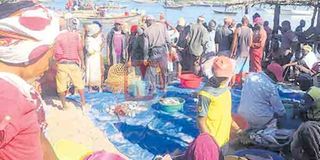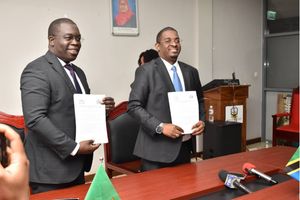SPECIAL REPORT : It takes a village to stop illegal fishing: Lessons from Namela

Fishermen land their catch as buyers take their pick in Namela Village, outside Mtwara Municipality. PHOTO | JANETH MESOMAPYA
What you need to know:
- However, only men fish in deeper waters, which takes longer. Women can only be found at the shallow water along the shore. However, all of them know they have the responsibility to stop illegal fishing.
Mtwara. As midday approaches in Namela Village, some 11 kilometres from Mtwara Municipality, fishermen can be seen coming from the sea with their morning catch. Both men and women in this village along the coast participate in fishing, which is their main economic activity.
However, only men fish in deeper waters, which takes longer. Women can only be found at the shallow water along the shore. However, all of them know they have the responsibility to stop illegal fishing.
Making illegal fishing history
In fighting illegal fishing, villagers of Namela have proved that it takes a village. Like any fishing society that practices illegal fishing, the people’s development and standard of living had been affected.
So they came together and formed Beach Management Units (BMUs) in collaboration with local government leaders. These BMUs are independent units of people in the village, organised for the conservation of water bodies’ natural resources working hand in hand with the government, society members and other stakeholders. BMUs are commended to have helped the reduction of illegal fishing through thorough and regular patrols in the ocean area to capture those involved in the illegal business. Today, Namela has managed to eradicate illegal fishing totally.
According to Village Chairman Hassan Matimbango, there has been a complete end illegal fishing in the past year. There are now no reports of dynamite use, which has endured for decades and still exists in other communities across the country.
“Our success has also been achieved through partnership with World Wildlife Fund (WWF), which has been facilitating awareness programs on how to preserve our beach resources and the effects that come along with embracing illegal fishing. This has enabled more villages to join BMU and commit to totally ending the problem. And we do this by sharing information, creating more awareness to villagers and fishermen,” he said.
Matimbango adds that initially, the exercise of capturing fishing offenders received negative and harsh response from some villagers especially those whose relatives were involved in the misconduct. However, things have been changing over time. People are now more receptive to change.
Ring net fisherman Mohamed Nassoro said due to this achievement, they have witnessed a tremendous increase in amount and varieties of fish in the ocean, even in shallow water.
“We’re now able to catch very scarce types of fish which have been rare to find in the past years because of being troubled and destroyed by illegal fishing,” he said. Nassoro said that his income has now also increased, compared to two years ago when illegal fishing. More fish means more money.
Who buys all the fish?
What great joy that there is now more fish and more varieties that are being caught, since illegal fishing in coastal zone of Tanzania is said to have declined for approximately 80 percent. However, the fishermen say that their biggest concern remains to be the availability of a stable market.
According to Matimbango, their village has unorganised fishing selling spot by the ocean famously known as ‘Mwalo’ where sailors and fish vendors do business.
However, he said, this setting is of the fishermen’s loss because the vendors buy at a lower price and take them to a town market, selling at a higher price. “Why not introduce a fish market in the same area?” asks Matimbango.
He goes on: “If we open a market here, customers will come from Mtwara Town to buy fish at the market. The prices will be reasonable and both villagers and fishermen will be satisfied. It’s a win-win situation.”
Secretary of Beach Management Unit (BMU) at Imekuwa Village Yussuf Othumani said that things aren’t much different in his village. He said illegal fishing in his village has been dropping drastically, causing the increase of fish availability which require an accommodative market for the business. Yet, vendors remain the main hindrance since there is absence of a proper marketplace.
“When fishermen from the rural areas go to sell fish in town, they’re required to pay 5 percent of their earning as levy to the municipal council. This to them appears to be extremely unfair,” he said.
More challenges
He also added that the existing places for fish selling along the coastal area of Mtwara rural are characterised by the absence of necessary facilities like toilets, making people respond to their natural call anywhere. Also, there are no built-in tables to place the fish, so they put them on the ground, which is not a healthy way of selling food items. Fisherman Mohamed Salum from Imekua Village mentioned a great demand for more refrigerators to store fish for a longer time.
The community in Mtwara Region are also troubled with the having old and worn-out fishing equipment. It’s been reported by villagers and BMU leaders that there is only one motorised boat in Mtwara and this is used for night patrols to control illegal fishing in all nine wards of the region.
“Fishing is our main source of income here and we only have one motorized boat donated by the WWF but still it isn’t enough as it caters for nine wards,” said the BMU’s chairperson in Namela village, Ms Habiba Mohammed.
She added that the situation had caused fishermen to continue using their old and ineffective fishing tackle. They risk their lives by doing so, since they use very small canoes that can vulnerable to strong winds at night. This affects productivity in the sector.
Call to the government
Ms Mohammed further called upon the government to increase its investment in the fishing industry as it has done in agriculture. There is a need for the government to give loans to the fishermen so that they can buy modern fishing equipment such as boats and refrigerators.
The fishermen in Mtwara also highlighted the importance of the government to have trainings and awareness programs for fishermen in order to increase productivity in their activities. Some of the key areas for awareness-raising include knowing the safe ways to sail, techniques for self-rescue and how to make their business more rewarding.
Fishermen as well requested the government to establish fish processing factories that will be a milestone for the increased internal and external fish market.
According to a fisherman and village security committee chairman in Somanga Village in Kilwa, Mr Mohammed Mgeni, acknowledged that things are changing in Kilwa.
He says troubling times started during the second phase government led by former President Ali Hassan Mwinyi. However, recent efforts to curb the problem are proving to be successful.
“Kilwa used to harvest up to four tonnes of fish a month. However, in the recent months this year, we get up to about eight tons of fish a day because of the decreased illegal fishing. This highlights the relevance to establish processing factories in this zone,” he said.
This request goes along with the government opening up a door for more investments in the fisheries sector.
Two years ago, before this big fish bloom in the South, the executive director of the Tanzania Chamber of Commerce, Industry and Agriculture, Mr Daniel Machemba, told The Citizen that although Tanzania has huge fishing potential in the Indian Ocean, the private sector is yet to exploit it for increased exports, according to stakeholders. He added that fishing companies are yet to fully exploit such resources in the Indian Ocean.
“Private companies and smallholder fishermen are catching huge quantities of fish for export and local consumption in fresh waters to the extent of causing over-exploitation and threat to the environment. But they are yet to unlock the huge potential in the sea,” he said.
According to him, government has to initiate a market survey and assessment of fish potential to enable investors to come in with sound business plans for establishing various ventures for fish production, processing and export. There is still room to change things in the fisheries, some two years after he made these comments.




